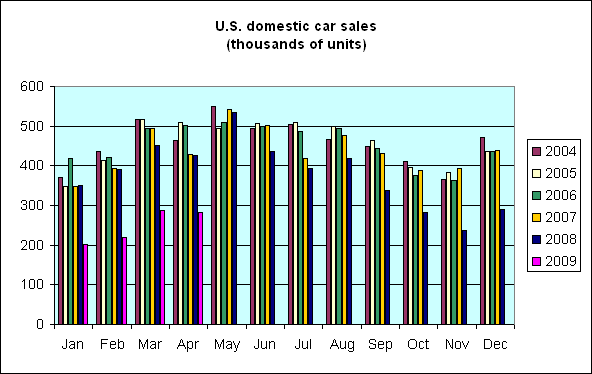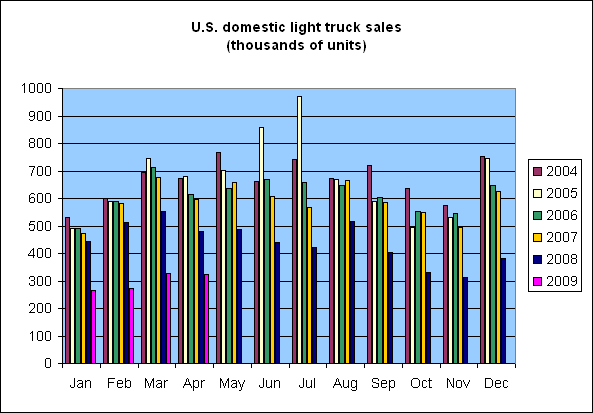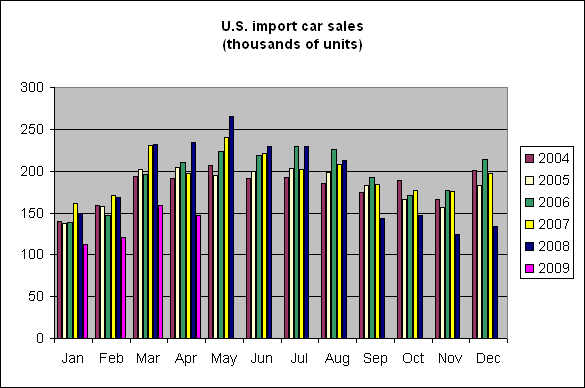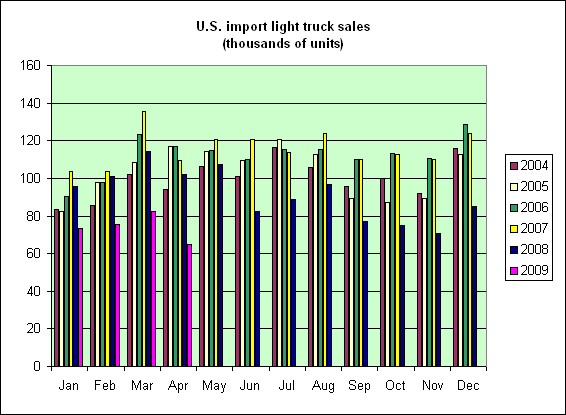April sales of light vehicles manufactured in North America were down by about a third from the values seen a year ago. And a year ago we were already seeing recession-level values for auto sales.
 |
 |
April year-over-year sales declines of imports were even bigger in percentage terms.
 |
 |
Some analysts had hoped we’d seen the worst in February. But the April numbers make it pretty clear that optimism was premature.
And so Chrysler filed for Chapter 11 bankruptcy protection on Thursday. Plan A is for the company to continue to sell cars, and get back to producing them shortly. But both become a bigger challenge once you’re wearing the scarlet B. From the WSJ:
Across the country dealers Friday were scrambling to line up new banks to provide auto loans for buyers after the company’s ailing lending partner, Chrysler Financial, stopped providing loans with subsidized interest rates such as 0% deals….Chrysler was preparing to shut down all of its vehicle assembly plants for 60 days on Monday. But on Friday two plants in the U.S. and two in Canada were forced to cease production because a few suppliers stopped shipping parts or materials.
Officials from the Obama administration’s auto task force cautioned that there was no reason that suppliers should be hesitating over shipments to Chrysler or getting worried about payments.
“It is the company’s intentions to continue to pay suppliers in the ordinary course,” said one official. “This company will operate in the ordinary course throughout the bankruptcy process.”…
Chrysler’s Conner Ave. assembly plant, which builds the Dodge Viper, has been stopped by interruptions in its parts supply for the last three weeks, said Chris Vitale, a worker at the plant.
It is possible, as President Obama declared on Thursday, that
The necessary steps have been taken to give one of America’s most storied auto makers, Chrysler, a new lease on life.
But this is a pretty tough environment in which to pull that off. And even if it succeeds, there’s no getting around the fact that, for the immediate future, these disruptions mean a further hit to the incomes of Chrysler workers, suppliers, and dealers.
But hey, at least the bankruptcy should generate a few hundred million for the lawyers.
Technorati Tags: macroeconomics,
autos,
auto sales,
economics,
recession
Just another government backdoor bailout to the lawyers associations.
Maybe they should make cars we want to buy at prices we can actually afford?
I’m sick of expensive gas-guzzling autos everywhere.
The economy hasn’t figured out that the auto plants ultimately solve the gas problem. Our period of innovation that we see after each energy shock seems to be overwhelming the auto industry. Perhaps the economy has figured out that the automobile cannot get the efficiency gains we need.
Why did I not become a lawyer?
It would have been a fast-track to a $300K income (or higher), that is recession-resistant.
Donna opines on 05/03/09 @ 10:00 AM
“Maybe they should make cars we want to buy at prices we can actually afford? I’m sick of expensive gas-guzzling autos everywhere.”
Hey Donna…
Ever hear of the ‘Two Fleet Rule’?
http://online.wsj.com/article/SB122645159441719325.html
It would be too much to say good bye to Chrysler and still be handing billions to Citi…is the political reality.
I should state that I have a very high opinion of James Hamilton and Menzie Chinn and consider neither to belong to the set of academic economists I criticized in the preceding comment.
@ MattYoung
“Perhaps the economy has figured out that the automobile cannot get the efficiency gains we need.”
Yes, because a 25% vehicle level efficiency internal combustion engine is always more efficient than a 90% vehicle efficiency electric drive motor? No, wait, hmm, last time I checked, 90 is more than 25, so your statement is just weird.
Perhaps when some more people feel the punch of performance electric drive torque off the line when next to a pure gasser at a light that turns green (Stop Light Grand Prix), we’ll permanently see the improved automobile efficiency tipping point in our rear view mirrors.
Keep in mind that not too long ago, the conventional thinking was “[p]erhaps the economy has figured out that the automobile cannot get the efficiency gains we need” relative to horses.
SAAR auto sales.
Jan-09…9.5700
Feb-09…9.1225
Mar-09…9.8648
Apr-09…9.3175
May be bottoming, but no sign that they are going anywhere. Feb was the low point.
This is not encouraging for 2nd Q real GDP.
GM has already announced a summer shutdown of 9 weeks rather than the usual 2 weeks.
C says it will shut down while in bankruptcy.
Will be a big negative for industrial production.
I’m sorry, James_Hamilton, I seem to be at loss to where you get the premise of 90% of your posts here, that the strength of the economy is crucially dependent upon auto sales remaining at or above 2005 levels.
Where do you get this premise, so that I can understand why I should care about the auto industry as much as you seem to want to make me?
Silas Barta: If what I intended to say was, “the strength of the economy is crucially dependent upon auto sales remaining at or above 2005 levels”, then what I would have said was, “the strength of the economy is crucially dependent upon auto sales remaining at or above 2005 levels”.
Instead, I offer these data as another window on how things are going for one part of the U.S. economy.
James_Hamilton: Maybe I didn’t convey my confusion well. What I mean is, at least every few weeks you post about auto sales. You do not do the same for, say, tractor sales, food sales, computer sales, cosmetics sales, diaper sales, furniture sales, etc.
So clearly you do not merely see cars as “one part of the U.S. economy”. Would you agree you place a disproportionate emphasis on this sector of the economy?
If yes, then my quesiton is why you think it deserves such an emphasis.
If not, can you give me examples of where you’ve followed e.g. cosmetics as closely, or a sector you consider to be more comparable?
Silas Barta: The first reason I present these charts every month when the auto data come out is that, to my knowledge, Econbrowser is the only location on the web that provides these numbers this way, and seeing them this way is key for me in any case to get an idea what they mean.
As for why we pay more attention to autos than cosmetics, one of my key research interests is how oil price shocks affect the economy, and for that question, certainly autos figure much more prominently than cosmetics. You might for background check these earlier posts:
[1], [2].
Spencer,
The auto sales increase in March seems to be in part due to the increase in discounts. The average discount dropped in April.
Here is the average discount for GM
4/09 $4,063
3/09 $4,772
3/08 $3,132
There are three markets.
1. consumer
2. business
3. government
in Jan and Feb consumer fell while business rose.
in March consumer had a big pop and business fell.
This would be in line with MikeR’s observation.
I am interested in the auto sales thread and relationship to economy. It does seem to be a likely key because, one, auto expenses are large relative to disposable income and two auto owenership is often a major personal ego factor. As a result it reflects both economic capability and confidence. Of course it is all more complicated than that and what we need to do is move away from our auto/oil dependence if we want a more stable system.
@ Silas Barta and Prof. Hamilton
On the fringe, but:
Because cosmetics contain lithium, one potential secondary source of lithium for plug in electric vehicle power packs is from local landfills (not to mention all the lithium cell phone batteries that many folks currently throw directly away). More to the point, some manufacturers that specialize in lithium use in consumer products make both power packs and cosmetics, so there may be very slight substitution effects between lihtium plug in electric drive based vehicles and cosmetics. Thus, increasingly, owning and using the newest generation of lihtium plug in electric vehicles is also a high fashion statement. It’s an interconnected world after all. So looking at new vehicle markets (once someone bothers to start tracking all the lithium (and other chemistry) power pack plug in vehicles currently in production and coming on line) will now also help you understand cosmetic markets, a little.
Zero X,
That was funny… (it was meant to be, yes?)
As for electric cars, unless you are pro nuclear power, all they do is transfer polution from the car to the utility company. Most of our power comes from fossil fuels. The more progressive french rely more heavily on nuclear power… and more power to them.
JDH, I’d like to see total cars to total light truck sales. I’m wondering why fuel economy had been declining up until the economy came a hault in early-mid ’08.
Do you know how I can get data on the fleet make up?
It’s plausible that truck sales still outpaced car sales. I’d like to rule that out.
It’s also plausible that efficient cars from the early 90s are dropping out of the fleet faster than they are replaced by new cars and the opposite could be true of trucks. It’s also plausible that old in-efficient cars are being restored because the price vs newer more than makes up for the additional fuel expense.
I think it’s more likely to rain chocolate fudge over the entire eastern seaboard for the next two day though.
I believe that auto sales may be at or very close to the bottom based on the scrap rate for vehicles. The scrap rate is around 5.5% per year, which with a vehicle fleet of 240 million vehicles, would mean about 13.2 million vehicles scrapped per year. Just replacing these vehicles would provide a level of demand above the current SAAR. Including new drivers buying their first vehicle, and immigration, would add about another 1.5 million units to the annual demand.
It looks to me like the shadow inventory of excess SUVs sitting in driveways is being consumed, and the clunkers that are being driven a few extra miles have reached their limits. Auto sales should stabilize at this level and begin increasing soon.
Mike R:
Er, you meant that to be a straw man, right?
“That was funny.”
Sure, rebuilding a large, failed domestic industry self-captive to a demand price inelastic fuel source is highly amusing, if you say so. Or do you think that the economic concept of substitutes is funny? I assure you, industry leaders take it seriously.
“As for electric cars, unless you are pro nuclear power, all they do is transfer polution from the car to the utility company.”
Wow, I thought this creaky old debunked thinking was dead. Your statement is factually untrue. I suggest you read the Pacific National Labs, EPRI and NRCD studies, for starters, to get up to date with reality.
My street legal, highway capable, commercially made in the US, electric vehicle is 100% wind powered from a local (thus, very minimal transmission losses) commercial wind farm, thanks to a subscription plan from my regional power utility, at costs less than coal in most states. So no pollution at my vehicle or at my utility level, no nuclear, and my fuel dollars stay domestic rather than fund volatile parts of the world.
Menzie, could you please discuss the potential implications of the future of the US debt market w.r.t. the Chrysler and GM BK’s?
If secured debt holders are henceforth junior to political considerations, what risk premium will be required for debt to sell?
I wouldn’t want to be a Chrysler shareholder watching all of this. Oh wait . . . I guess I am thanks to the involuntary investment of my future tax revenues. [Sigh.]
It’s very informative post/story about sales of light vehicles manufactured in North America (well-presented graphically).
Thank you.
as GK -Why did I not become a lawyer? as well.